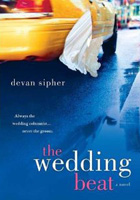
 Devan Sipher has been writing about weddings for The New York Times’ "Vows" column for more than five years. He received a master of fine arts degree from the Tisch School of the Arts at New York University. He lives in New York City, and is still single. Here he talks about the inspiration for his new novel, The Wedding Beat, which follows Gavin Greene, a hopeless romantic --- and lonely, single guy --- who writes the wedding column in a popular newspaper.
Devan Sipher has been writing about weddings for The New York Times’ "Vows" column for more than five years. He received a master of fine arts degree from the Tisch School of the Arts at New York University. He lives in New York City, and is still single. Here he talks about the inspiration for his new novel, The Wedding Beat, which follows Gavin Greene, a hopeless romantic --- and lonely, single guy --- who writes the wedding column in a popular newspaper.
That’s what I’ve learned from five years of writing the Vows wedding column at The New York Times. Sure, a few thousand years’ history of raping and pillaging suggests otherwise. But beneath the stubble and the Sportscenter addiction, most men are as confused, vulnerable and romantic as women when it comes to falling in love. They just don’t like talking about it.
Did I mention I’m also one of those men?
Yes, I’m a guy. A single, Jewish guy over 40 who writes about weddings. (It’s killing my parents.) But here’s the secret: I enjoy it. I get paid to be curious. And no topic is off limits. My interviews are sometimes closer to therapy than journalism (and more than one professional therapist has suggested I could have a future in their line of work). But my goal isn’t to analyze, it’s to accurately convey the lives of two people, the love they share, and the obstacles they overcame to sustain that love. I think of my articles as profiles in romantic courage.
However, working 80-hour weeks, including weekends, isn't the way to sustain my own love life. There’s a thin line between being a hardworking journalist at one of the best newspapers on the planet and being a lonely guy spending his Saturday nights at other people’s weddings.
Everything changed while covering a wedding in December 2008. I had a Christmas party I was looking forward to attending (lots of single women), but ended up with a wedding on the same night. Fortunately, it was a very sweet and straightforward story. So I was planning on high-tailing it out of the reception after the first dance.
The problem was that there were speeches. Lots of speeches. I kept checking my watch as it got later and later. But here’s the thing: they were really good speeches. Funny, touching, and they illuminated aspects of the bridal couple I didn't know about. I finally left the reception after midnight and jumped into a taxi. The wedding was on the Lower East Side of Manhattan and the Christmas party was on the Upper West Side. In between was the parking lot known as New York holiday traffic on a Saturday night. After 20 minutes I had gone less than a half dozen blocks. I got out of the taxi and walked home.
That’s when it occurred to me that my situation would be much more amusing to someone who wasn’t living it. The Wedding Beat was born. I thought it would offer me the opportunity to share what I had learned from talking to so many brides and grooms. (I was hoping I had learned something.) It would also allow me to put to rest the idea that only women thrive on romance. I heard far too many stories from guys who had sweated it out with a diamond in their pocket on a mountaintop to subscribe to that notion.
And anyone who thinks only women are emotional wrecks after breakups hasn’t been out with a drunk male friend who’s been dumped by his girlfriend. I had one friend who was inconsolable for months. And when I say inconsolable, I mean it was all he talked about. Why did she leave? What could he do to get her back? Where would he ever find anyone as perfect as she was? (Perfect except for the dumping him part.) I think he assumed that I would be particularly tolerant of his emotional outpourings, because of what I did for a living. But I felt like I gave at the office, so to speak. Meanwhile, within six months he met the woman he would eventually marry. That’s the inspiring thing I’ve learned writing The Wedding Beat --- love can happen to anyone at any moment.

